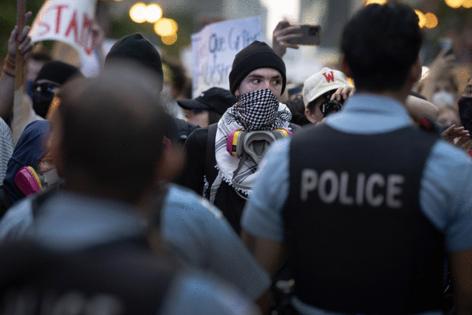Heidi Stevens: As demonstrations over immigration policy erupt, we can't forget the human hearts at the center
Published in Lifestyles
A friend of mine was driving her son home from his graduation dinner the other night when their car was surrounded, suddenly, by police officers in riot gear.
While she and her family were eating and celebrating, thousands of demonstrators were flooding Chicago’s streets to protest the immigration crackdowns playing out across the United States.
On their drive home, a tale of two cities collided.
It’s going to be that kind of summer. (Year? Decade?) Scenes of joyful milestones and hallowed rituals and routine living playing out alongside constitutionally protected — and unquestionably justified — unrest.
Less than a week prior, aldermen and community organizers clashed with immigration officials outside a U.S. Customs and Immigration office in Chicago’s South Loop neighborhood, where immigrants were told to come for a check-in appointment and then detained when they arrived.
“They are boxing them in,” Erendira Rendon, vice president of immigrant justice at the Resurrection Project, told the Chicago Tribune after the South Loop arrests. “You will get deported if you show up to your hearing as mandated by law, but you will also get deported if you don’t show up to your hearing.”
In California, protests against ICE sweeps have been rocking Los Angeles and its surrounding communities, with President Donald Trump deploying thousands of National Guard troops and U.S. Marines to the area despite Gov. Gavin Newsom’s legal attempts to block their arrival.
This may be our new normal for a while.
As of this writing, “No Kings” demonstrations were scheduled to play out in towns and cities across America, part of a national movement to protest authoritarianism and provide counterprogramming to Trump’s military parade marking the U.S. Army’s 250th anniversary and his own 79th birthday.
Also as of this writing, I’m watching friends and acquaintances work through a series of calculations that weigh the risks of protesting a cruel and chaotic administration, versus the risks of staying silent as cruelty and chaos march onward, laying waste to so much of what we hold dear. Including our values. Especially our values.
These are complicated calculations.
Here’s what I know. Years from now, my son’s friend will remember the night he was riding home from his graduation dinner, his mom at the steering wheel, his whole life ahead of him like an unwrapped gift, and his city’s streets filled with protesters. A pivotal time in his life collided with a pivotal time in history.
Here’s what I also know. Some of the protesters also just graduated from something — high school, maybe. College, maybe. Grad school. Law school. Whole lives ahead of them. Pivotal times colliding.
Some of the protesters, surely, had kids who just graduated too. And so did some of those police officers.
It’s easy and convenient, when we’re living through times that call for heroes and villains, to focus on what divides us. But it’s more honest to look for the things we share. The things we all hold dear. The things that keep all of us awake at night.
I also know this. The chance to graduate from something — high school, college, grad school, law school — compels a lot of people to leave their homes, leave their relatives, leave their land and immigrate to this country.
Democracy does too. So does the right to peacefully protest. So does the right to due process. The principles that made America the proverbial shining city upon a hill — reflecting hope and promise to the world — were always intended to serve, at least in part, as an invitation to join this grand experiment.
So surely when we’re debating immigration, surely when we’re witnessing the crackdowns and sweeps and threats of mass deportations, we can make room in our hearts and minds and conversations to acknowledge that humans are at the center of this moment. Humans who come here in search of a better life. Humans who want their kids’ whole lives to lie ahead of them like an unwrapped gift.
The things we all hold dear.
And maybe that factors into your calculation, when you’re deciding what to support and whether to protest.
And maybe this does too. It’s an anecdote from Michele Hornish’s latest Small Deeds Done newsletter.
Hornish writes about Women Strike for Peace, a group of activists who protested nuclear testing in the 1960s. At the time, radioactive fallout was showing up in breast milk and baby teeth, and Women Strike for Peace staked out on the White House lawn holding signs that called for change.
“One of the women later admitted that, standing there in the rain, she felt ‘foolish, and futile,’” Hornish writes. “And really, can you blame her? She was likely soaked, and freezing, and holding a soggy sign that was getting battered by the weather. There was no indication from the White House at the time that they were moved by the demonstration.”
But a pediatrician happened to be visiting the White House that day. And he happened to look out the window and see the women protesting in the rain. And he thought, Hornish writes, that if they felt strongly enough to be out there in the rain, maybe they were onto something.
“That pediatrician’s name was Dr. Benjamin Spock — whose name you may know because he became one of the leading activists against nuclear testing and proliferation,” Hornish writes. “In fact, it was his work on the impacts of nuclear testing on children’s health that was instrumental in changing policy — leading to the Limited Test Ban Treaty of 1963 that ended above-ground testing.
“And he may never have gotten involved in the issue in the first place,” she continues, “had that woman and her friends not stood out in the rain.”
Pivotal times colliding. Complicated calculations. But humans, always, at the center.
©2025 Tribune News Service. Distributed by Tribune Content Agency, LLC.
























Comments